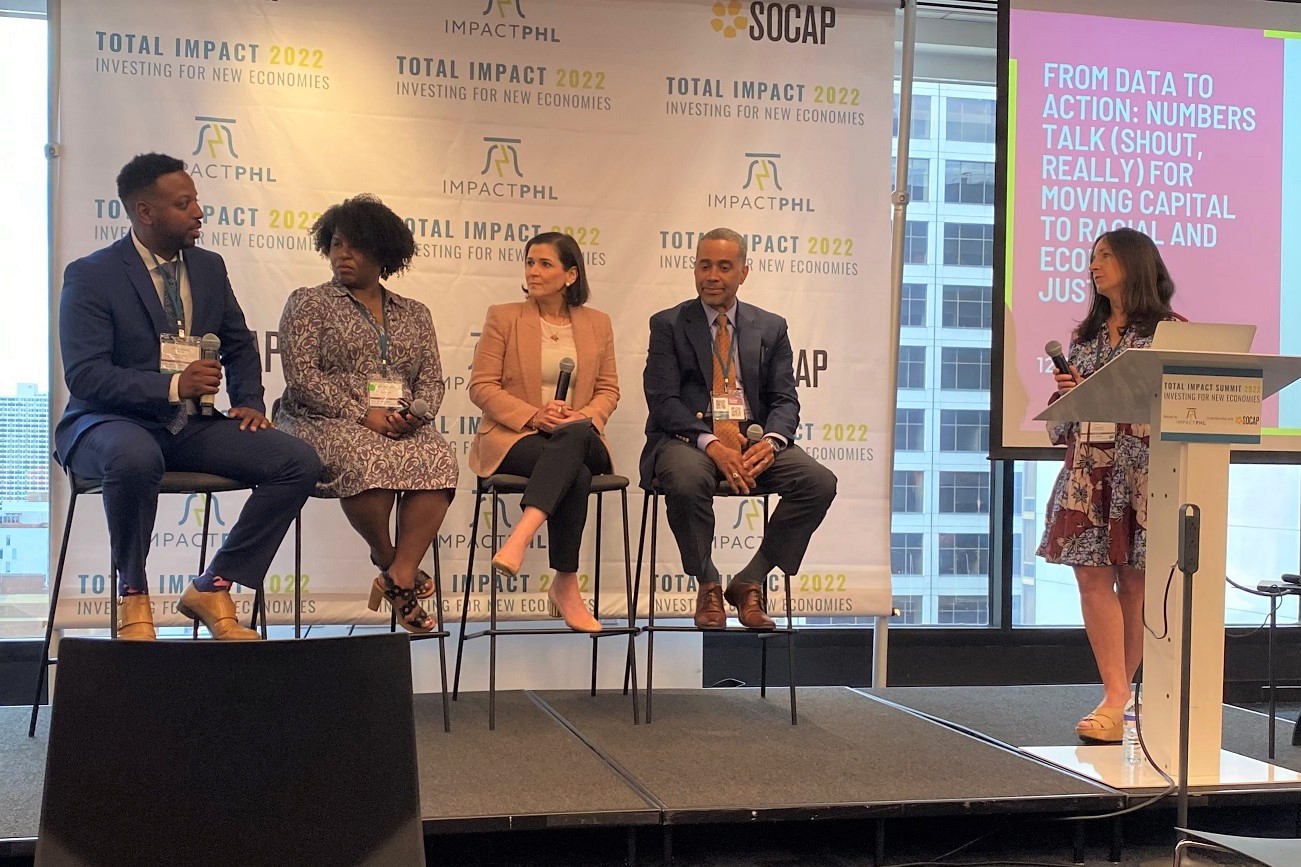Investors, fund managers, financial advisers and leaders across the global impact investing community met recently in Philadelphia for the Total Impact Summit 2022: Investing for New Economies. The two-day summit took place at a pivotal moment for the impact movement in the U.S. This year, ESG investing has been in the crosshairs more than ever before as investors grapple with a looming bear market, recessionary fears and an energy crisis amid the Russia/Ukraine war. At the same time, our society is facing unprecedented social and environmental challenges as we continue to witness the devastating impacts of climate change and the horrific effects of racial injustice.
The complexity and enormity of these hurdles were certainly a focus for speakers and attendees alike at Total Impact. However, I was inspired by the sense of optimism, passion and productivity that underpinned all the discussions. Della Clark, CEO of The Enterprise Center in Philadelphia, set the tone for the summit with her comment during the opening panel: “Changing the way capital works is going to change the way our society works.”
Looking ahead to the second half of 2022 and beyond, here are some of my takeaways from Total Impact for impact investors and the broader financial sector:
1. Not enough is being done to address racial injustice. Just weeks before the two-year anniversary of George Floyd’s murder, we witnessed a horrific racially driven mass shooting in Buffalo, New York. It is clear that not enough has been done in the public and private sectors to address racial injustice in our society. As Clark stated in reference to corporate action, “There’s been a lot said, but the action isn’t there.” Investors and corporations alike play an important role in creating a just and equal society for all.
2. You’re leaving money on the table if you ignore diverse talent. Gender-diverse teams are 21% more likely to outperform, noted Patience Marime-Ball, co-author of “The XX Edge.” This applies to racial diversity as well. However, there’s an ingrained bias against investing with minority managers in the asset management industry. Marvin Owens, chief engagement officer of Impact Shares and a Gregory FCA client, said: “Despite outperformance, asset allocators are not making the right decisions when it comes to equity.” We must change the perception that investing with minority managers means sacrificing returns.
3. We need to continue making the business case for impact investing. The U.S. investor is data-driven and, unfortunately, we haven’t gotten past the need to make the business case for impact. Due to a lack of disclosure requirements and other regulations, the U.S. is well behind Europe when it comes to sustainable investing. ESG ratings are currently all over the place in the U.S., but we’re seeing a consistent appetite from investors for more transparency, noted Carly Greenberg of Principles for Responsible Investment (PRI). Standardization of disclosure from a company/issuer standpoint will go a long way in helping to make the case for impact investing in the U.S.
4. Divestment is often disengagement. The divestment movement was necessary in the early stages of impact investing to identify problems at companies. However, engagement has proven to be a much more valuable tool for enacting change, shared Yusuf George, managing director of Engine No. 1. George has led a number of high-profile corporate engagement and proxy voting initiatives with GM and JD Trucking. Notably, he helped lead the effort to replace three members of the ExxonMobil board in order to create a strategic plan to decarbonize, proving the influence of collective shareholder action.
5. There’s power in place-based investing. Most investors aren’t aware of the investment opportunities right outside their front door. Philadelphia is leading the way in the place-based investing movement, showcasing how local entrepreneurs and startups can shape a more positive future for a city. Just look at First Step Staffing — a nonprofit staffing agency brought to Philadelphia via a $7 million investment from local impact investors. Since 2018, First Step Staffing has generated over $77 million in wages in Philadelphia and over 7,700 jobs — 80% of which have gone to formerly incarcerated individuals, veterans and those experiencing homelessness in the past 12 months.
When we turn on the news or check our social media feeds, it’s easy to be discouraged by the seemingly endless parade of tragedies and negative news stories. However, Total Impact served as an important reminder of the power of capital in changing the world. While there’s much more work to be done, I’m encouraged by the intelligence and perseverance of the impact leaders working to shape a more equitable, sustainable economy.
